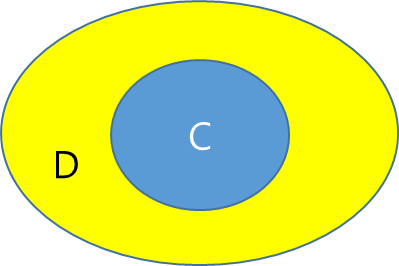티스토리 뷰
업캐스팅과 다운캐스팅
예시
public class Main {
public static void main(String[] args) {
Scanner sc = new Scanner(System.in);
double num = sc.nextInt();
}
}이거 에러 나지 않는다. => 큰 그릇에 작은 애를 담았으므로
upCasting => 암묵적 캐스팅
하지만
public class Main {
public static void main(String[] args) {
Scanner sc = new Scanner(System.in);
double numA = sc.nextInt();
int numB = numA; // 에러
}
}이건 에러.
=> 우리(개발자)는 double타입으로 선언했으나, 이것이 int가 들어갈 것을 알고 있지만,
컴파일러 입장에서는 작은 타입(int)에 큰 타입(double)의 수를 넣는다고 오해하고, 에러를 내게 된다.
따라서 이렇게 바꿔줘서 에러를 해결해야 한다.
명시적 캐스팅(downcasting)
public class Main {
public static void main(String[] args) {
Scanner sc = new Scanner(System.in);
double numA = sc.nextInt();
int numB = (int)numA;
}
}
클래스 예시
class Parent {
}
class Child extends Parent {
}
public class Main {
public static void main(String[] args) {
Parent parent = new Child(); //가능, 업캐스킹
// 상위 타입에 하위 타입을 담으면, 얼마든지 담을 수 있다.
//Child child = new Parent(); //불가능
//Child child = parent; // 이것도 불가능.
// 위에서 Child를 담았지만, 타입 자체가 Parent이기 때문에
// 컴파일러는 여기서 검사할 때 타입만 검사한다. 에러
// 따라서 명시적 캐스팅(down casting) 필요
Child child = (Child) parent;
}
}
여기서 헷갈리지 말아야 할 것은 일반적으로 부모 클래스보다 상속받은 자식 클래스의 개념이 더 크다는 것.
그냥 분리(기본자료형과 클래스를) 해서 생각하는게 더 속 편할 것.
클래스의 경우,
Parent라는 껍데기에 자식이 들어오면,
자식은 부모+a 이므로 에러 나지 않는다.
그런데,
Child(자식) 껍데기에 부모(Parent)가 들어오면,
부모는 자식이 하는 일을 다 하지 못하니까 위험하다.
ex.
최신형 세탁기에 낡은 엔진이 들어가면, 낡은 엔진은 추가된 세탁기 기능을 다 따라가지 못한다.
하지만 낡은 껍데기에 최신형 엔진이 들어가면, 최신형은 옛날 기능도 가지고 있기 때문에 충분히 기능 소화가 가능하다.

class Parent {
}
class Child extends Parent {
}
public class Main {
public static void main(String[] args) {
Parent parent = new Parent();
Child child = (Child) parent; // 이것도 가능은 함.
}
}타입은 Parent지만 개발자가 "child가 들어왔다고 내가 보증할게" 가 된다.
컴파일러는 판단할 때 타입만 보기 때문에
Parent parent = new Parent();
// Parent parent1 = new Child();이거 두개가 사실상 같다고 판단함.
하지만 실행하면
Exception in thread "main" java.lang.ClassCastException:
class mega.backend_onemore.Day24.Parent cannot be cast to class
mega.backend_onemore.Day24.Child (mega.backend_onemore.Day24.Parent and mega.backend_onemore.Day24.Child are in unnamed module of loader 'app')
at mega.backend_onemore.Day24.Main.main(Main.java:17)이런 컴파일 에러가 난다.
instanceof
- 때로는 타입이 아니라 진짜 객체가 뭔지 궁금할 때가 있음.
class Parent {
}
class Child extends Parent {
}
public class Main {
public static void main(String[] args) {
Parent parent = new Parent();
if (parent instanceof Parent) {
System.out.println("True");
}
else {
System.out.println("False");
}
}
}실행 결과
True
class Parent {
}
class Child extends Parent {
}
public class Main {
public static void main(String[] args) {
Parent parent = new Child();
if (parent instanceof Parent) {
System.out.println("True");
}
else {
System.out.println("False");
}
}
}실행 결과
True
또다른 예시 1
class Parent {
}
class Child1 extends Parent {
}
class Child2 extends Parent {
}
public class Main {
public static void main(String[] args) {
Parent parent1 = new Child1();
Parent parent2 = new Child2();
if (parent1 instanceof Child1) {
System.out.println("True");
} else {
System.out.println("False");
}
System.out.println("================");
if (parent2 instanceof Child2) {
System.out.println("True");
} else {
System.out.println("False");
}
}
}실행 결과
True
================
True
또다른 예시 2
class Parent {
}
class Child1 extends Parent {
}
class Child2 extends Parent {
}
public class Main {
public static void main(String[] args) {
Parent parent1 = new Child1();
Parent parent2 = new Child2();
if (parent1 instanceof Child2) {
System.out.println("True");
} else {
System.out.println("False");
}
System.out.println("================");
if (parent2 instanceof Child2) {
System.out.println("True");
} else {
System.out.println("False");
}
}
}실행 결과
False
================
True
자식은 부모 객체라고도 볼 수 있다.
또다른 예시 3
이게 가장 헷갈리는 부분
class Parent {
}
class Child extends Parent {
}
public class Main {
public static void main(String[] args) {
Parent parent = new Parent();
if (parent instanceof Child) {
System.out.println("True");
} else {
System.out.println("False");
}
}
}실행 결과
false=> 여기서 물어보는 것은 parent가 Child의 인스턴스로서 역할을 할 수 있느냐.
더 쉽게 말하자면 parent가 Child일 수 있느냐.
그런데 Child는 확장된 거고, parent는 확장 안 된 거니까, 이건 false
'[개발] - Java > Mega' 카테고리의 다른 글
| 함수 유의사항 + 물 가져오기 문제 유의사항 (0) | 2023.05.04 |
|---|---|
| <보충> Day24. 업캐스팅과 다운캐스팅 (0) | 2023.05.04 |
| Day23. super 보충 (0) | 2023.04.30 |
| <보충> Day28-29 파일 입출력 (0) | 2023.04.30 |
| <보충> 컬랙션 추가 공부 (2) Map, Set, Queue (0) | 2023.04.28 |
